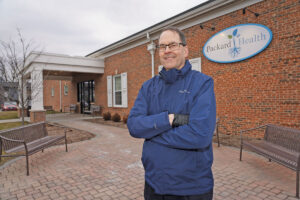When I arrived home after interviewing physician Ray Rion, executive director of Packard Health, Pamela Herrara, who cleans for us, was just leaving. When I told her where I had been, she said all three generations of her extended family are patients there, because it offers bilingual care. Most are immigrants from Mexico, and, though she speaks fluent English, others are more comfortable in Spanish. Along with regular physicals, her relatives are seen for issues ranging from high cholesterol and high blood pressure to arthritis and diabetes.

Packard Health executive director Ray Rion at the clinic on Carpenter Rd. | Photo: J. Adrian Wylie
This fits with Packard Health’s original goal. When Jerry Walden founded it in 1973, he wanted to care for whoever walked in his door, whatever their situation in life, health problems, or financial resources. In the half-century since, it’s grown to include four clinics, an active outreach program, and connections with a wide variety of other nonprofits.
Walden’s mission started while studying medicine at U-M in the 1960s, when he spent several months providing care in Nigeria. After graduation he did alternative national service at a penitentiary in Terre Haute, Indiana, caring for incarcerated patients.
“I couldn’t help noticing that most of the inmates were Black, while the guards were White,” he recalls. He emerged with an even deeper belief in “working across the racial divide.”
—
Walden returned to Ann Arbor in 1969 to work at Summit Medical Center. Its founder, Ed Pierce, had left a middle-class practice to serve people in what was then a racially mixed working-class neighborhood. (Now known as Water Hill, it’s more expensive and less diverse these days—see the Home Sales Map, p. 88.) Named for its first office, a small, two-bedroom home on W. Summit St., it later moved to the corner of Spring and Hiscock.
Walden opened a second Summit location at 3137 Packard in 1973. After Pierce left medicine to pursue a political career (he served as state senator and mayor), it became the Packard Community Clinic.
Walden followed the same model as Pierce, treating all patients who came to his office regardless of their ability to pay; many had poor or no insurance. The clinic managed to stay “barely afloat” financially, says Packard board member Deborah VandenBroek, on “the Robin Hood principle”—fees are on a sliding scale, so that better-off patients subsidize those who can’t afford care.
VandenBroek says that vision, and the fact that the medical community knew Walden was a good doctor, attracted other like-minded physicians as well as a dedicated support staff. One such hire was Rion, who joined the Packard staff in 2003 after working in a similar clinic in Alpena. Rion recalls Walden telling him, “If you like taking care of people and a diverse group of patients, working at Packard is like working in the garden.”

Founder Jerry Walden with Marcia Barrabee and Blondeen Munson at the Summit Medical Clinic in 1971.
Rion succeeded Walden as Packard’s executive director in 2012. He works with a fifteen-member board, nine of whom, according to the bylaws, have to be patients at Packard. Loath to give up direct patient care, he still spends 30 percent of his time working as a doctor.
By the time Rion took over, funding for health care was increasing. It started in 2010 with the Affordable Care Act, aka “Obamacare,” which expanded Medicaid and subsidized health insurance. A few years later, a new program began funding “federally qualified health centers”—places like Packard that accept patients regardless of income or insurance status. According to VandenBroek, “this was the end of hand-to-mouth funding,” although they still need to do additional fundraising.
With more resources, Packard could provide services it only dreamed of before. It opened four new locations, at 1915 Pauline and 2650 Carpenter in Ann Arbor, and in Ypsilanti at 200 Arnet and the New Covenant Missionary Baptist Church at 2345 Tyler. All are full-service clinics, including mental health treatment. The Packard office closed in 2021, and administration was moved to a building in Pittsfield Twp. donated by health care entrepreneurs Dick and Norma Sarns.
The new funding has allowed Packard Health to bring medical care directly to vulnerable populations, serving people who might be unable or unwilling to come to a clinic. Their clinicians now visit Dawn Farm, Avalon Housing, SafeHouse Center, Jewish Refugee Services, Miller Manor, and the Delonis Center. Delonis has also set up a recuperation center, a place with six beds where patients without another place to stay can recover from an illness. Packard also works with Home of New Vision, which gives gender-specific care for people suffering from addiction.
Pride in what they are doing is not the only reward. In 2023 Rion was named the Michigan Family Physician of the Year by the Michigan Academy of Family Physicians. The Ann Arbor City Council followed suit by giving him an award for his achievements.
Calls & Letters, Apr. 2024
“I wish to correct an inaccurate part of the article entitled the Evolution of Packard Health,” founder Jerry Walden emailed. We’d written that its namesake location on Packard initially opened a branch of his prior employer, the Summit Medical Center.
In fact, Walden writes, “In 1973 I left Summit. A modest ($70K) grant was secured from Model Cities to purchase and remodel 3174 Packard and I founded the not-for-profit Packard Community Clinic. The PCC goal was high-quality medical care for all, especially the underserved in the Ann Arbor–Ypsilanti community.”


